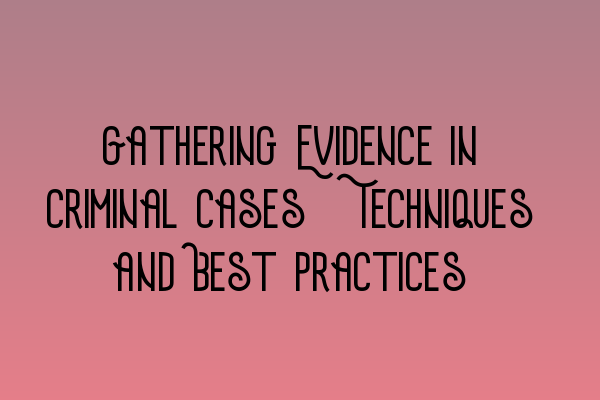Gathering Evidence in Criminal Cases: Techniques and Best Practices
When it comes to criminal cases, gathering evidence plays a crucial role in establishing the guilt or innocence of the accused. As a criminal solicitor at SQE Criminal Law & Practice Law UK, it is important to stay updated with the latest techniques and best practices for collecting evidence. In this article, we will explore the various strategies that can help strengthen your case.
1. Effective Interviewing
One of the primary techniques for gathering evidence is conducting effective interviews. By asking the right questions and actively listening to the responses, you can uncover valuable information that can support your case. Remember to document the interviews thoroughly, as these records may serve as evidence during the trial.
For SQE 1 preparation courses and practice exams related to evidence gathering techniques, check out our SQE 1 Preparation Courses and the SQE 1 Practice Exam Questions.
2. Forensic Analysis
Forensic analysis plays an important role in criminal cases, providing scientific evidence that can strengthen your arguments. Working with experienced forensic experts can help you uncover crucial details that may have been overlooked. Preserve the chain of custody for all evidence and ensure it is properly documented.
For SQE 1 practice mocks related to forensic analysis techniques, take a look at our SQE 1 Practice Mocks FLK1 FLK2.
3. Surveillance and Digital Evidence
In the digital age, surveillance and digital evidence can provide significant insights into criminal activities. Employing surveillance techniques, such as video recordings or tracking devices, can help capture key moments or movements. Additionally, digital evidence, such as emails, social media posts, or phone records, can contribute to building a strong case.
For comprehensive SQE 2 preparation courses, including topics on surveillance and digital evidence, explore our SQE 2 Preparation Courses.
4. Witness Statements and Expert Testimony
Witness statements and expert testimony can greatly impact the outcome of a criminal case. Ensure that witness statements are obtained promptly and accurately. Thoroughly vet any potential expert witnesses to ensure their credibility and expertise in the relevant field. These statements and testimonies can provide valuable evidence that strengthens your case.
5. Collaboration with Law Enforcement
Collaboration with law enforcement agencies is crucial for gathering evidence in criminal cases. Work closely with the police and other investigative agencies to gather information and access resources essential for your case. Establish strong professional relationships to facilitate efficient evidence collection.
Stay updated on the latest SRA SQE exam dates by visiting our SRA SQE Exam Dates page.
In conclusion, gathering evidence in criminal cases requires a combination of effective interviewing, forensic analysis, surveillance, digital evidence, witness statements, expert testimony, and collaboration with law enforcement. By implementing these techniques and best practices, you can enhance the strength of your case. For comprehensive preparation and practice materials relating to these techniques, be sure to check out our SQE preparation courses and practice exams.
